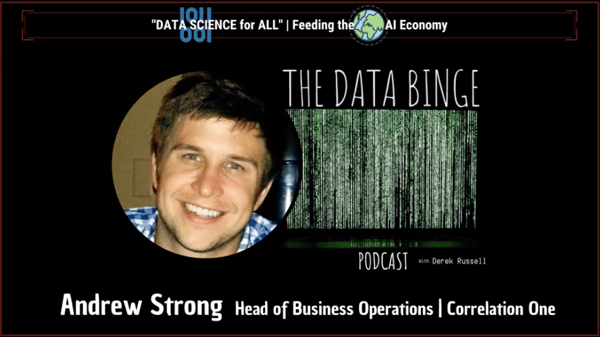C1's Andrew Strong on the Data Binge Podcast // Data Science for All: Feeding the AI Economy
On August 6th, Correlation One's Andrew Strong joined Microsoft's Derek Russell on the Data Binge Podcast. The discussion covered a range of topics, including education reform, opportunity, and the importance of diversity in data science and AI. Catch the full video stream in the link, or browse the discussion highlights below.

https://www.linkedin.com/video/live/urn:li:ugcPost:6697244218630512640/
What gives you energy behind the things you're doing?
Our mission statement at Correlation One is Data Science for All. We think Data Science is going to be one of the largest economic forces in history. We also think it has the potential to be one of the most disruptive forces, and we want to make sure that the transition to a data science economy is an equitable one. And that takes a number of different forms. First, we need to make sure that data science organizations are composed of diverse and representative groups of people. But it also means that, as data driven algorithms become more present in our society, those algorithms themselves need to be fair, unbiased, and transparent. There's a lot of work that needs to be done as we make this transition, so that the data-driven economy is one that benefits everybody.
On Data Literacy
Data Science is permeating the economy on a number of different vectors. From an industry perspective, first it was the tech and finance companies that were using data science. Now it's logistics, e-commerce, and insurance companies... every company is becoming a data company. Another vector is that the roles themselves and the nature of work that people are responsible for is inevitably becoming more data driven. HR, Marketing, Sales, and Operations are all becoming more and more focused on data, and the implication there is that more and more people will need data skills.
So C1 is doing a lot of work around the talent component of data. How do you work with organizations to help them build data teams, and what excites you about that process?
First, as I mentioned it's no longer just the data org that needs to think about their analytics function. Now every department has some data capabilities that are required within them, and so the consequence is that it's important for companies to instill a data culture across the board. This makes individual teams more productive, it also helps improve collaboration across teams because they are now speaking the same language.
Another consequence of a data economy is that within data organization, it's important to build teams that are representative of the users of their products, and inclusive and diverse in ways that sometimes the tech industry is often not.
It's uniquely important for the Data Science industry to get the diversity problem right because not only is it going to be a huge part of the economy, but the actual products that data scientists produce are decision making tools. It's really important that these products are unbiased, fair, and equitable, and the best way to do this is to have the people building these tools be representative of society as a whole.
One thing we've discussed in the past is how expensive it is to build unbiased products. It's expensive to get diverse datasets. It's expensive to hire somebody, and do market analysis on diverse customer groups. It's expensive to do all these things, and then employers are telling us they don't have diverse candidates in the talent pool. What is your response to those challenges?
I think it's a fair statement to make. Historically, it is challenging to build diverse teams when 70% of students in data related PhDs are not diverse. What we identified is that diversity in data is not a demand-side problem -- the demand-side problem would be that employers are biased in their hiring practices. Most of the organizations we work with are very proactive about trying to build diverse data science teams, but it's difficult when the candidate pipeline does not reflect that.
What we're doing at Correlation One is addressing the supply-side issue. We need to train more data and analytics professionals from under-represented groups, so that employers can connect with them more easily.
And we've deployed a fairly interesting model -- we run advanced, masters-level training programs, led by professors from Harvard and MIT. But the programs are completely free for participants, funded by endowed scholarships from corporations who recruit out of the program. So ultimately, what we aim to do is remove structural barriers from people from underrepresented groups, which could be racial, could be gender, could also be geographic -- rural areas and countries that don't have opportunities typical of the big tech hubs.
Listen to the full interview at:
https://www.linkedin.com/video/live/urn:li:ugcPost:6697244218630512640/
Apple Podcasts: https://podcasts.apple.com/us/podcast/andrew-strong-data-science-for-all-feeding-the-ai-economy/id1355543236?i=1000488918938
Spotify: https://open.spotify.com/episode/06iB7yPryk52IiVamanjLI?si=H2dFohZZSZq0peyOqipCbw
Youtube: https://youtu.be/wYtuZUOxumM





